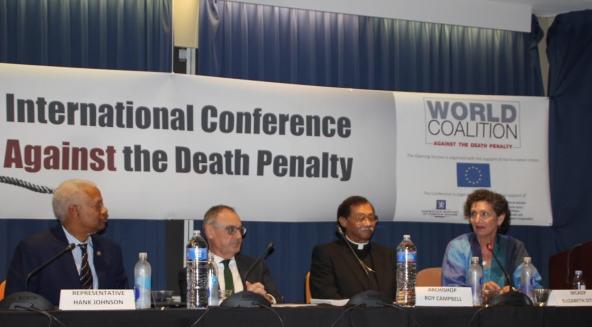
International Conference Against the Death Penalty: abolistionists are united and determined
The World Coalition celebrates its 15th anniversary
It has been 15 years since several activists and professionals have been actively struggling for the abolition of the death penalty worldwide. In 15 years the Coalition has proven itself and shown its effectiveness by the numbers of events organized for the World Day Against the Death Penalty but also by the fact that in 15 years numerous countries have abolished the death penalty, including the most recent example of Mongolia which has brought the number of abolitionist countries to 141.
This progress is evidence of the outcome of the intense and effective work of the different actors that compose the Coalition. The location chosen for this Assembly, Washington, is also meaningful as the United States remain one of the biggest executioners in the world. Organizing this conference in the United States allowed to support American organizations and to raise awareness among the American public on this issue, by providing public sessions.
More than a General Assembly, this meeting was a real International Conference against the death penalty not only for its program, but also for the quality of its speakers. It gathered more than a hundred of participants from all over the World (United States, United Kingdom, Malaysia, Morocco, Nigeria, Tunisia, Niger, Puerto-Rico, France, Italy, Cameroon, Uganda, Norway, Tanzania, Jordan, Liberia, Taiwan, Democratic Republic of Congo and Australia) giving an interesting multicultural dynamic to this meeting.
“All crimes are best fought through a functioning judicial system, not through taking life.”
This big abolitionist gathering began with an Opening Ceremony lead by the President of the World Coalition, Elizabeth Zitrin. Several influent personalities also took the floor, such as the Ambassador of the European Union in the United States Mr. O’Sullivan, Bishop Roy Campbell or Congressman Hank Johnson, representative of the 4th district of the state of Georgia. addressing the situation in the United States, the Ambassador of the European Union took this occasion to recall that “All crimes are best fought through a functioning judicial system, not through taking life.”
Read the full speech of the Ambassador M. O’Sullivan in this article.
This International Conference then continued with two plenary sessions. The first one was dedicated to the death penalty and poverty, the theme of the next World Day Against the Death Penalty, in which intervened Shreya Rastogi, Center on the Death Penalty, National Law University Delhi (India) Adaobi Egboka, LEDAP (Nigeria), Florence Bellivier, FIDH (France), and Robin Maher, University of George Washington (United States). "What does poverty have to do with the death penalty? In a word, everything" stated Robin Maher.
Later on, two workshops took place: one on the UN mechanisms and the Universal Periodic Review with Amy Bergquist, the Advocates for Human Rights and Chiara Sangiorgio, Amnesty International. And one dedicates to the presentation of the training manual: Advocating for the abolition of the death penalty in sub-Saharan Africa, animated by Angela Uwandu, Lawyers without borders (Nigeria), Fulgence Massawe, Legal and Human Rights Center(Tanzania) and Nestor Toko, Droits et Paix (Cameroun).
Torture in Guantanamo and wrongful convictions: the horrors of our time.
Another plenary session focused on the death penalty in the USA with the interventions of Robin Maher, Robert Dunham, executive Director of Death Penalty Information Center, and Madhuri Grewal, the Constitution Project, who highlighted the importance of local politics regarding the death penalty underlining that 5 prosecutors are responsible of 15 percent of the death sentences in the United States and recalled that only 31 states already abolished the death penalty in law or in practice.
See The Report of the Oklahoma Death Penalty Review Commission of the Contsitution Project
You can also read the article of DPIC about the General Assembly of the World Coalition.
Major Rashid Williams, military defense lawyer in Guantanamo took the floor during this session delivering a poignant testimony of his experience as a lawyer. Therefore, he stated that there are currently 2 cases implicating 6 people sentenced to death in Guantanamo, and went on to speak more precisely on his client’s case Ammar Al Balucci, claiming that was tortured during its incarceration. This situation is also denounced by Amnesty International in its campaign to close Guantanamo.
And last but not least, this day ended with powerful testimonies of seven death row survivors from Witness to Innocence, such as the one of Kwame Ajamu who was wrongly incarcerated for more than 28 years. Sharing their difficult journey and the suffering they had to endure, these survivors give all the meaning to the fight for the abolition of the death penalty which must continue until the complete abolition of the death penalty worldwide.
The second day of this conference held statutory meetings to elect a new Steering Committee and a new executive Board, as well as different workshops for members organizations. A workshop presented by Madalyn Wasilczuk, Sharon Pia Hickey, Cornell Center on the Death Penalty Worldwide (United States), and Hsinyi Lin, Taiwan Alliance to End the Death Penalty (Taiwan), focused on the fact-finding methodology to interview the death row population. Another workshop focused on communications and advocacy, led by Margot Freeman, Communications expert and Richard Dieter, former director of DPIC.
It’s important to underline the active implication of the members organizations as participants and as speakers during this conference allowing interesting discussions, which might lead to common actions and partnerships.



